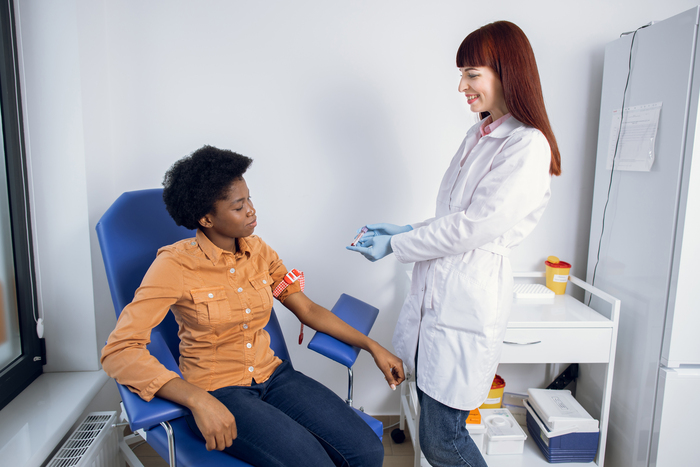
Ensure your health. Get tested today.
Convenient lab testing at your fingertips at more than 5,000 locations nationally. Consult with a doctor, or get tested on your own.

A lipid panel test is a crucial diagnostic tool that measures various types of lipids in your blood, including cholesterol and triglycerides, according to MedlinePlus. They explain that these lipids play essential roles in your body's overall function, but imbalances can signal underlying health issues.
High or low levels of these lipids are key indicators for conditions such as cardiovascular disease, diabetes, and metabolic syndrome, according to MedlinePlus. They note that understanding the significance of lipid panel tests, how to prepare for them, and what the results mean can empower you to take proactive steps toward maintaining optimal health. This article will guide you through the intricacies of lipid panel tests, ensuring you are well informed and prepared for your next medical check-up.
A lipid panel is a blood test that provides a comprehensive snapshot of your body's lipid levels, which are essential fats that play crucial roles in your overall health, according to MedlinePlus. They note that this test measures various types of lipids, including total cholesterol, low-density lipoprotein (LDL) cholesterol, high-density lipoprotein (HDL) cholesterol, and triglycerides. Each of these lipids serves different functions, and their levels can provide valuable insights into your cardiovascular health and risk for conditions such as heart disease, stroke, and diabetes.
During the test, a healthcare professional will draw a small sample of blood, usually from a vein in your arm, according to MedlinePlus. The sample is then analyzed in a laboratory to determine the concentrations of the different lipids, they note. The results can help your healthcare provider develop a treatment plan if necessary, which might include lifestyle changes, medications, or further testing. Understanding what a lipid panel measures and why it matters can empower you to take control of your health and make informed decisions, according to MedlinePlus.
Lipid profile
Lipid test
Cholesterol panel
Lipid blood test
Fasting lipid panel
A lipid panel is a vital diagnostic tool that can benefit a wide range of individuals, from those undergoing routine health check-ups to patients with specific medical concerns, according to MedlinePlus. They note that this test is not only essential for monitoring existing health conditions but also for diagnosing potential issues before they become severe.
By measuring various lipid levels in the blood, healthcare providers can gain valuable insights into a patient's cardiovascular health, enabling them to recommend appropriate interventions and lifestyle changes. Understanding who needs a lipid panel and why can help you stay proactive about your health, according to MedlinePlus.
Reasons a doctor may ask for a lipid panel test, according to MedlinePlus:
As a routine test to monitor overall health and detect early signs of lipid imbalances.
For monitoring reasons, especially if you have a history of high cholesterol or other lipid-related conditions.
To help diagnose a medical condition, such as cardiovascular disease or diabetes.
If you have a family history of heart disease or high cholesterol, making you more susceptible to these conditions.
To evaluate the effectiveness of treatments, such as medications or lifestyle changes, aimed at managing lipid levels.
Preparing for a lipid panel test is an important step to ensure accurate and reliable results, according to MedlinePlus. They note that one crucial aspect of this preparation is understanding whether fasting is necessary, as it can significantly impact the measurements of certain lipids in your blood. This section will guide you through the steps you need to take before undergoing a lipid panel test, helping you get the most precise insights into your cardiovascular health.
Traditionally, fasting for 9 to 12 hours before a lipid panel test has been recommended, particularly when measuring triglycerides and LDL cholesterol levels, according to MedlinePlus. Fasting means abstaining from all food and beverages, except water, to avoid any temporary spikes in lipid levels caused by recent meals. However, recent guidelines suggest that non-fasting lipid panels can also provide valuable information, especially for routine screenings. It's essential to follow the specific instructions provided by your healthcare provider, as they will tailor their recommendations based on your individual health needs and the purpose of the test, according to MedlinePlus. Always consult with your doctor to determine if fasting is required for your lipid panel and adhere to any other preparatory guidelines they provide, according to MedlinePlus.
Interpreting the results of a lipid panel test is crucial for understanding your cardiovascular health and identifying potential risks, according to MedlinePlus. This section will break down the optimal levels for each of the four standard lipid measurements, helping you to better understand your results and what they mean for your overall well-being. Knowing these benchmarks can empower you to take proactive steps in managing your health, according to MedlinePlus.
Optimal levels for lipid panel tests, according to MedlinePlus:
Total cholesterol: Less than 200 mg/dL
High-density lipoprotein (HDL) cholesterol: 60 mg/dL or higher
Low-density lipoprotein (LDL) cholesterol: Less than 100 mg/dL
Triglycerides: Less than 150 mg/dL
Receiving abnormal results from a lipid panel test can be concerning, but it's important to understand what these results might indicate and what steps you should take next. Abnormal lipid levels can signal various health issues, but with the right guidance and interventions, you can effectively manage and improve your lipid profile, according to MedlinePlus. They note that abnormal results in a lipid panel test may indicate an increased risk of cardiovascular diseases, such as heart disease and stroke, or other conditions like diabetes and metabolic syndrome.
High levels of LDL cholesterol and triglycerides, or low levels of HDL cholesterol, are particularly concerning and warrant further attention. If your results are outside the optimal range, your healthcare provider will likely recommend additional tests to pinpoint the underlying cause and assess your overall risk profile, according to MedlinePlus.
They explain that the next steps typically include lifestyle modifications such as adopting a heart-healthy diet, increasing physical activity, quitting smoking, and managing stress. In some cases, medication may be prescribed to help regulate lipid levels. Regular monitoring and follow-up tests will also be essential to track your progress and adjust your treatment plan as needed. Consulting with your healthcare provider to develop a comprehensive and personalized approach is the best way to address abnormal lipid levels and safeguard your health, according to MedlinePlus.
A lipid panel test measures the levels of various types of lipids, including total cholesterol, LDL cholesterol, HDL cholesterol, and triglycerides in your blood.
Lipid panel tests are important because they can help detect imbalances that may indicate health conditions such as cardiovascular disease, diabetes, or metabolic syndrome.
Traditionally, you should fast for 9 to 12 hours before a lipid panel test, but recent guidelines suggest non-fasting lipid panels can also be useful. Always follow your healthcare provider's specific instructions.
The results of a lipid panel test can provide insights into your cardiovascular health. Optimal levels are less than 200 mg/dL for total cholesterol, 60 mg/dL or higher for HDL cholesterol, less than 100 mg/dL for LDL cholesterol, and less than 150 mg/dL for triglycerides.
If your lipid panel test results are abnormal, your healthcare provider may recommend lifestyle changes, medications, or further testing. Regular monitoring and follow-up tests will be essential to track your progress and adjust your treatment plan as needed.
Optimal levels are less than 200 mg/dL for total cholesterol, 60 mg/dL or higher for HDL cholesterol, less than 100 mg/dL for LDL cholesterol, and less than 150 mg/dL for triglycerides.
If your lipid levels are abnormal, it may indicate an increased risk of cardiovascular diseases or other conditions. This may require further tests, lifestyle modifications, and possibly medication.
No, a lipid panel test is not only for those with existing health conditions. It can also be used to diagnose potential health issues before they become severe.

Convenient lab testing at your fingertips at more than 5,000 locations nationally. Consult with a doctor, or get tested on your own.